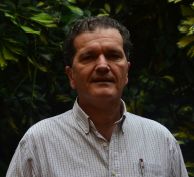Services on Demand
Journal
Article
Related links
Share
Odontoestomatología
Print version ISSN 0797-0374On-line version ISSN 1688-9339
Odontoestomatología vol.18 no.27 Montevideo May 2016
HEALTH, COOPERATION AND DEVELOPMENT

First, I would like to thank Odontoestomatología for their kind invitation to write this editorial, where I would like to share with the readers a few reflections on oral health, both at national and international levels.
Health professionals aim to improve the health of the population, so as to promote human development.
Throughout history, health professionals have made major contributions to society: knowledge, scientific development, and their daily professional work in the area of patient care. They have done so with the utmost devotion and effort, thus contributing to the well being of people and societies.
In turn, academic institutions where professionals are trained, which explore reality, promote changes, and disseminate knowledge in their role as key social stakeholders, should aim for this utopia, which cannot be achieved, but which is something to strive for.
Health issues can be addressed in two ways: individually and collectively.
Dental training has traditionally focused on addressing problems on an individual basis. The current state of development enables us to find solutions to practically any health problem people might have, ranging from health promotion to the most sophisticated types of rehabilitation.
Contributing to the oral health of the population entails more than adding up individual actions; rather, it means addressing health problems scientifically in the areas of Population Health, Collective Health or Public Health.
At the School of Dentistry we promote collaborative work to foster development in different areas:
• contributing to the health of Uruguayans,
• strengthening our links with national institutions that share this objective, especially health care institutions,
• developing academic teacher training by providing clear links with health care practice and with international reference centers,
• promoting the international exchange of knowledge from graduate programs,
• forging links between nations that wish to share knowledge and development; first with countries within the region, and also with institutions in other countries that have made major progress in the area of health care,
• creating a culture of open and transparent co-operation within institutions, which in turn promotes development.
In our institution, Odontoestomatología is a privileged means to disseminate knowledge. Additionally, it fosters academic and professional links with its readers, who share this utopia by reading these pages.


First, I would like to thank Odontoestomatología for their kind invitation to write this editorial, where I would like to share with the readers a few reflections on oral health, both at national and international levels.
Health professionals aim to improve the health of the population, so as to promote human development.
Throughout history, health professionals have made major contributions to society: knowledge, scientific development, and their daily professional work in the area of patient care. They have done so with the utmost devotion and effort, thus contributing to the well being of people and societies.
In turn, academic institutions where professionals are trained, which explore reality, promote changes, and disseminate knowledge in their role as key social stakeholders, should aim for this utopia, which cannot be achieved, but which is something to strive for.
Health issues can be addressed in two ways: individually and collectively.
Dental training has traditionally focused on addressing problems on an individual basis. The current state of development enables us to find solutions to practically any health problem people might have, ranging from health promotion to the most sophisticated types of rehabilitation.
Contributing to the oral health of the population entails more than adding up individual actions; rather, it means addressing health problems scientifically in the areas of Population Health, Collective Health or Public Health.
At the School of Dentistry we promote collaborative work to foster development in different areas:
• contributing to the health of Uruguayans,
• strengthening our links with national institutions that share this objective, especially health care institutions,
• developing academic teacher training by providing clear links with health care practice and with international reference centers,
• promoting the international exchange of knowledge from graduate programs,
• forging links between nations that wish to share knowledge and development; first with countries within the region, and also with institutions in other countries that have made major progress in the area of health care,
• creating a culture of open and transparent co-operation within institutions, which in turn promotes development.
In our institution, Odontoestomatología is a privileged means to disseminate knowledge. Additionally, it fosters academic and professional links with its readers, who share this utopia by reading these pages.

Dr. Pablo Bianco Ricci
Co-operation Unit - School of Dentistry
Cooperacion7@gmail.com-pbiancoricci@gmail.com
Co-operation Unit - School of Dentistry
Cooperacion7@gmail.com-pbiancoricci@gmail.com











 text in
text in 


